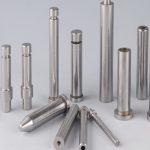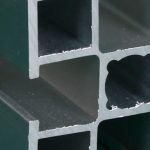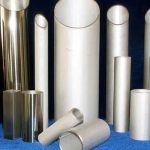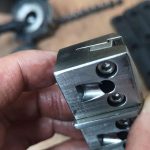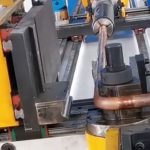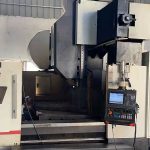The Application Of AC Servo System In Shelf Cold Roll Forming Line
|
The introduction of the pre-punching process and hydraulic stop shear technology in the cold-formed production line of the rack column not only expands the design range and manufacturing accuracy of the cross-sectional shape of the rack column, but also meets the requirements of the design and assembly of the rack steel structure system, and optimizes .The composition mechanism of the shelf steel structure, especially when the three-dimensional warehouse system rises and develops widely in our country, puts forward high requirements on the accuracy of the hole position and length control of the shelf column. |
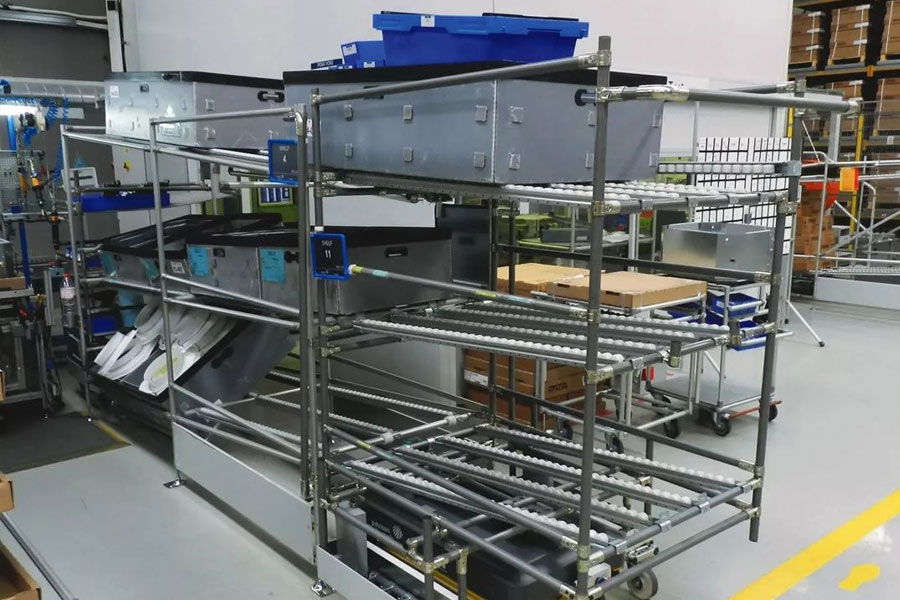
1.2 This article analyzes and discusses the pre-punching and hydraulic cut-off control devices of the imported shelf column cold bending forming production line using the AC servo control principle, and strives to achieve the purpose and requirements of high position accuracy control in many cold bending occasions. Encourage peers.
2. The working principle of the shelf cold bending forming line
2.1 The basic production process and equipment composition of the shelf cold roll forming line:
2.1.1 The general production process of shelf components is: uncoiling, leveling, servo feeding, punching, forming, rolling, straightening, cut-to-length, packaging, post-spraying treatment, etc.;
2.1.2 The corresponding equipment is: uncoiler, leveling machine, servo feeding device, press, cold bending rolling mill straightening head hydraulic cutting device and hydraulic station baler or other auxiliary equipment + electrical control system, etc.
2.2 The basic principle of the AC servo control system of the shelf cold roll forming line:
As shown in Figure 1.
2.3 The system is composed of five parts, namely computer, servo drive control card, AC servo speed control system, sensor detection and feedback, and auxiliary main action execution system. The main control program is only a few hundred K, running under the DOS operating system, the main control microcomputer is connected to the servo drive control card through the print port LP1, and sends position or speed commands through the data line, adaptive adjustment or setting PID adjustment parameters, see After the figure, and perform digital-to-analog conversion, output the ±10V analog signal through the corresponding control board and drive the servo motor after being amplified by the AC servo amplifier. The semi-closed-loop or closed-loop position control feedback system is increased by the motor shaft end. The quantitative photoelectric encoder provides signals to complete the position feedback of the position servo system. The sensing element in the position feedback loop-incremental photoelectric encoder transmits the real-time displacement changes of the moving parts to the site in the form of A and B phase differential pulses. Encoder pulse counting is performed in the control station to obtain digital position information. After the main control microcomputer calculates the deviation between the given position and the actual position, the corresponding PID control strategy is adopted according to the deviation range, and the digital control function is converted into analog via digital-to-analog conversion. Control the voltage and output it to the servo amplifier, and finally adjust the motor movement, complete the desired value of repeated closed-loop feedback positioning control, and realize the small error and high-precision position positioning in the control principle; then the main control program issues the operation of the auxiliary main action execution system Command to complete specific mechanical brake action, press punching motion, hydraulic stop shearing motion, etc.
2.4 The main features of this unit: high one-time investment cost, large AC servo power has certain limitations, but the later operating cost is low, especially the high yield rate of shelf components, high product precision, wide application range and high added output value .
3. Analysis and working principle of automatic feeder and punching device
3.1 The automatic feeding device of the pre-punching process of the cold bending forming production line of the shelf column is composed of an upper and lower pair of φ75 guide rollers. The main working power comes from an AC servo motor, which relies on the friction between the material plate and the upper and lower guide rollers. Force feeding, the strip steel distribution holes of the shelf column are stamped on the press. The main design is shown in Figure 2. This device was originally designed as a 3.7KW servo control system of Prouder, USA. Later, due to the development of new products, the work transmission load was increased, and According to the working principle shown in Figure 2, the position control between the power control part and the AC servo control is mainly realized by the ±10V analog signal, there is no power limit on the AC servo system, and it can be replaced in principle. It is the supporting AC servo controller and AC servo motor of the 5KW servo amplifier model MR-J2S-series of Mitsubishi Corporation, and according to the production accuracy requirements of the corresponding shelf components and the determination of the servo control accuracy: ±0.1, then The ratio of the circumference of the measuring roller to the measuring accuracy range is approximately: 1178. Rotary encoders above 1200PPR should be used, and the position accuracy control requirements can be well achieved in the later four years of application.
3.2 Mitsubishi MR-J2 servo system has the characteristics of good machine responsiveness, low-speed stability, and optimal state adjustment including mechanical systems. The speed frequency response is above 550HZ, which is very suitable for high-speed positioning occasions. For equipment with increased load moment of inertia ratio and poor toughness.
3.3 The automatic feeding device is mainly composed of the structure shown in Figure 3. (1) The photoelectric sensor 1# mainly feeds back the status of the steel belt entering the working area of the press, such as: excess material, lack of material, etc.; ⑵The servo motor is guided downward through the gear box The feed roller transmits the conveying power. The gearbox transmission ratio i and the motor speed determine the feeding and positioning speed of the system; (3) The rotary encoder measures the position signal transmitted by the upper guide roller through the movement with the sheet material. ⑷The mechanical brake realizes the positioning The rear position is fixed; ⑸photoelectric sensor 2# realizes the transmission of the position signal required by the work control of the press; ⑹the upper and lower molds realize the punching of the hole position; the punching tonnage matching of the press is required, the matching of the accuracy of the machine tool or the mold, etc.
3.4 The specific feeding step value of each die is determined by the PC setting the corresponding count pulse number or the length conversion value comparison, and is coordinated by the passive measurement feedback of the angle encoder connected to the upper guide roller, so as to realize the stamping Adjustable, high-precision, and no-accumulated error-free step feed stamping of the sheet material. The accumulated error is handled by the error compensation algorithm set in the program or manual correction to ensure the high-quality hole distance of the shelf column. Practice has proved very practical.
3.5 The automatic feeding device in the equipment system overcomes the shortcomings of manual feeding of the shelf column pre-opening flat steel belt. It has the characteristics of simple operation, reliable work, and high control accuracy. It can greatly improve labor productivity. It can achieve 70 times with a high-speed and high-precision press. The working frequency can be divided into two parts, and the working pressure can reach above 2500KN, which can form an independent operating system.
4. Analysis and working principle of shelf cutting device
4.1 The basic control principle is the same and shares a unified system. Its characteristics are: the number signal of the hole position on the shelf column is measured by the reflective photoelectric switch. At a certain number of holes, the internal main control program converts the number of holes measurement mode to the length measurement mode, and similarly completes the position feedback and positioning control of the position servo system. The main control microcomputer calculates the deviation between the given position and the actual position, and adjusts it in time. The AC servo motor moves and completes the positioning of the desired value, the main movement stops and leads the hydraulic cut-off device to control the solenoid valve to produce the cut-off work sequence;
4.2 The main difference between the control mode of hydraulic cut-off and the control mode of flying shear: ①The control precision of hydraulic cut-off is high, and the highest control accuracy is: ± about 0.1mm and no cumulative error, which is mainly reflected in the passive incremental photoelectric encoder High precision and control sequence requirements, the equipment one-time investment is high; but the first-time yield is high, the material utilization rate is high, and the flying shear control needs to increase the follow-up and reset device, and the control system is relatively simple; ②In the control principle, the hydraulic stop Shear is absolute control accuracy, there is no speed difference error, etc., flying shear is relative control accuracy, which is the relative error between the shear position and the movement of the workpiece, due to the uncertainty of the speed operation law or the fluctuation of the unit resistance and the work load. The main motion speed of flying shear control is relatively constant, which is conducive to the setting and adjustment of the operating parameters of the supporting welding equipment. The main motion curve of the hydraulic stop shear control mode is more complicated and high Low-speed conversion and motion stop states sometimes have a long length of calibration time; ④The production efficiency varies greatly, and the production efficiency of the flying shear is high, and it is easy to carry out production control; ⑤The requirements for equipment maintenance and operation control are quite different. ⑥Hydraulic cut-off mode is more conducive to solving the cut defects such as cut deformation and rebound of cold-formed profiles. In summary, it is necessary to formulate and select reasonable equipment control operation modes according to the characteristics of cold-formed products in order to obtain the maximum benefit.
5 Several main problems in control system design
5.1 Control accuracy of the input signal: The ratio of the circumference of the measuring roller to the measuring accuracy range ultimately determines the production control accuracy of the product. The product with a larger ratio should be selected as much as possible, and the appropriate measuring roller material and the contact between the measuring roller and the cold-formed part should be selected. Damping and elastic coefficient to increase the friction coefficient and contact pressure to prevent slippage errors in the measurement process.
5.2 Control accuracy of the output signal: The difference in the position loop PID control algorithm determines the control accuracy and results obtained by the PID control. For example, the solution method has a step response method, and three action characteristics are adopted according to the control characteristics: 1), only There are proportional control; 2), PI control; 3), PID control; and carry out PID calculation according to the speed shape and the measured value differential calculation formula, and perform the positive and negative action calculation and control under the corresponding accuracy requirements.
5.3 Tuning of PID system parameters: The main control microcomputer sends PID parameters to the control card to see if the given parameters meet the requirements of the control system. This process needs to be realized by parameter tuning. The main task of parameter tuning is to determine K, A, B and the sampling period Timer. The proportional coefficient K increases, so that the servo drive system is sensitive and responds faster. However, if it is too large, it will cause oscillation and the adjustment time will be longer; the integral coefficient A will increase, It can eliminate the steady-state error of the system, but the stability is reduced; the differential control B can improve the dynamic characteristics, reduce the overshoot, and shorten the adjustment time Timer. The specific tuning process needs to improve the control algorithm and parameter tuning method of the PID device of the digital position loop to formulate the on-site adaptation parameters and the actual on-site adjustment settings, and set them separately according to different products or load conditions, otherwise the position control process will be easily formed. Oscillation phenomenon. As shown in the open adjustment set in the design program.
5.4 The mechanical accuracy of the system is controlled within a certain error range, and the electrical control accuracy can be improved. Combined with the high-performance AC servo drive system, it can meet the requirements of high-precision position control in many occasions, and also improve the efficiency of position positioning. And precision.
5.5 The main program is an AC servo control system based on the PC development platform. The main functions are: man-machine dialogue to adjust product production data, device parameter settings and PID parameter setting, etc.; to realize data transfer and processing between PC and modules, and position loop PID control algorithm and control the movement of servo motor, realize the action of various related equipment, etc. Others such as: the setting and adjustment of the stamping step distance, the corresponding adjustment of each output pulse number under a certain length value, the control accuracy of the press, the servo feeding accuracy and the setting and adjustment of the servo feeding length value are all open design.
5.6 The main program design takes into account the failure warning program segments of some equipment, which greatly improves the operability of the equipment and the control of product production quality, and also reduces the time for equipment failure inspection to a certain extent.
6 conclusion
6.1 Practical application shows that the selection of a reasonable AC servo system can meet the requirements of the control system with fast response speed, high speed accuracy, and strong robustness. The actual application position control accuracy is up to about 0.1mm and can avoid cumulative errors. This control system can be used in the production of high-precision opening series of cold-formed steel products, especially products similar to shelf columns, that is, a cold-formed production line for cold-formed steel verticals and pre-punched holes with high-precision hole positions on the sides.
6.2 The AC servo system applied to the shelf cold roll forming production line can indeed achieve high position control accuracy; and the pre-punching mode and the hydraulic stop shear mode can be used independently, such as the shelf beam production process, there is no pre-punching mode, etc.
Link to this article: The Application Of AC Servo System In Shelf Cold Roll Forming Line
Reprint Statement: If there are no special instructions, all articles on this site are original. Please indicate the source for reprinting:https://www.cncmachiningptj.com/,thanks!
 PTJ CNC shop produces parts with excellent mechanical properties, accuracy and repeatability from metal and plastic. 5 axis CNC milling available.Machining high-temperature alloy range inclouding inconel machining,monel machining,Geek Ascology machining,Carp 49 machining,Hastelloy machining,Nitronic-60 machining,Hymu 80 machining,Tool Steel machining,etc.,. Ideal for aerospace applications.CNC machining produces parts with excellent mechanical properties, accuracy and repeatability from metal and plastic. 3-axis & 5-axis CNC milling available.We will strategize with you to provide the most cost-effective services to help you reach your target,Welcome to Contact us ( [email protected] ) directly for your new project.
PTJ CNC shop produces parts with excellent mechanical properties, accuracy and repeatability from metal and plastic. 5 axis CNC milling available.Machining high-temperature alloy range inclouding inconel machining,monel machining,Geek Ascology machining,Carp 49 machining,Hastelloy machining,Nitronic-60 machining,Hymu 80 machining,Tool Steel machining,etc.,. Ideal for aerospace applications.CNC machining produces parts with excellent mechanical properties, accuracy and repeatability from metal and plastic. 3-axis & 5-axis CNC milling available.We will strategize with you to provide the most cost-effective services to help you reach your target,Welcome to Contact us ( [email protected] ) directly for your new project.
Link to this article:The Application Of AC Servo System In Shelf Cold Roll Forming Line
Reprint Statement: If there are no special instructions, all articles on this site are original. Please indicate the source for reprinting:Alloy Wiki,thanks!^^


